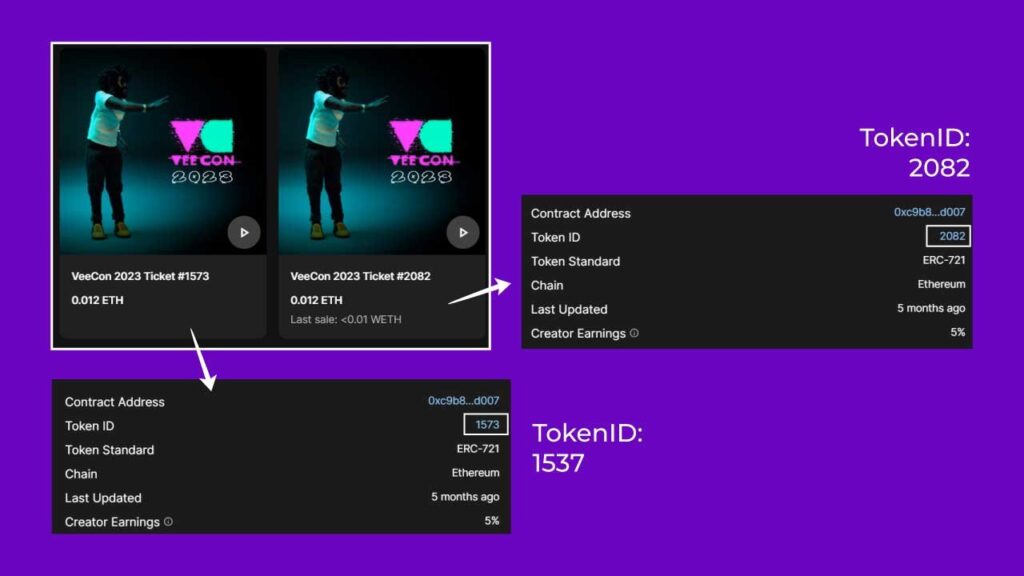NFTs aren’t just Punks and Penguin pictures. They present an incredible value proposition in a wide variety of industries, including ticketing.
NFT tickets represent a revolutionary shift in the way event tickets are issued, managed, and traded.
Unlike traditional tickets, which are usually printed on paper or stored electronically as QR codes, NFT tickets are digital assets secured by blockchain technology.
But what are these NFTs? What’s the point of issuing the tickets as NFTs? And what benefits these NFTs offer that traditional digital tickets can’t?
Let’s uncover!
NFTs, or Non-Fungible Tokens, are a type of digital asset that represents ownership or proof of authenticity of a unique item or piece of content.
Unlike cryptocurrencies such as Bitcoin or Ethereum, which are fungible and can be exchanged on a one-to-one basis, NFTs are indivisible and cannot be exchanged on a like-for-like basis.
A picture of a dumb ape is an NFT, and 0.01 $ETH is a cryptocurrency.
In the context of ticketing, NFTs are used to create digital tickets that are unique, verifiable, and tamper-proof.
Each NFT ticket contains unique token ID that distinguishes it from other tickets in the same event. Don’t believe me? Have a look at the token IDs of these 2 VeeCon 2023 tickets.

The significance of NFTs in the ticketing industry lies in their ability to address several longstanding challenges, including ticket fraud, scalping, and inefficient resale markets.
Each NFT ticket is backed by a smart contract that has preset rules, allowing owners to perform certain actions.
This means that each ticket is unique and cannot be replicated or counterfeited, offering enhanced security and transparency to both event organizers and attendees.
By leveraging blockchain technology, NFT tickets offer the following benefits:
Enhanced Security:
NFT tickets are virtually impossible to counterfeit or duplicate, reducing the risk of ticket fraud and unauthorized resale.
Transparency:
The decentralized nature of blockchain ensures transparency in ticket ownership and transaction history, enabling both event organizers and attendees to track the provenance of each ticket.
Immutable Ownership:
Once a ticket is minted as an NFT, its ownership is recorded on the blockchain, providing irrefutable proof of ownership and eliminating disputes over ticket authenticity.
Smart Contract Functionality:
NFT tickets can be programmed with smart contracts, enabling automated processes such as ticket transfers, refunds, and revenue sharing between event organizers and creators.
Emotional Connection:
An NFT has the ability to become a valued collectible (A ticket to Michael Jordan’s first NBA game was sold for $468k) like a paper based one.
But a paper based ticket can be hard to store. A digital ticket is easy to store, but that’s just a boring QR code or an amazing graphic, but not unique.
On the other hand, an NFT ticket is unique, and the proof of ownership exists on the blockchain forever. Now, what’s the need to prove to someone that you have it? Utility!
Easy to attach a utility:
Providing something in return to the attendees is something that can be done with NFTs easily. You can attach a physical product, or even a discount of 30% for the next event in the year 2049.
Those who has their NFTs in their wallets, can always use their NFT tickets to claim the benefits.
Liquidity:
As long as there is some degree of demand to the NFT ticket that you bought, you can always resell it. Or even pretty easy to transfer it someone, for free.
Royalty:
On every resale of the ticket, the ticket issuers aka event organizers can earn a certain percentage of that transaction.
Data Tracking:
The issuer can track the seller history based on the ticket resales (which can be easily seen on the blockchain) enabling more consumer data collection on festivalgoers. This data can help artists and ticket issuers to improve and tailor their shows to their specific audience.
From music concerts to sporting events, using NFT tickets have already been put into practice by many.
And you won’t find these NFT tickets on popular ticketing apps like TickPick or StubHub.
Most of the times, if you have mint it, you can do that directly from the official websites of the events.
Once the NFT gets minted, you have to buy it from official NFT marketplaces like OpenSea or Magic Eden.
Coachella has launched NFTs with the aim of connecting the Coachella NFTs to tangible real-world benefits such as lifetime passes to the event and access to exclusive areas and attractions. They’ve launched 3 collections, along with their own NFT marketplace.
AfterParty hosted an NFT Art & Music Festival, and they’ve launched 1500 NFTs. All these NFTs acted as a ticket to enter and as an access pass to all things at Afterparty.
From members only IRL events, to a dedicated concierge and virtual events on the Afterparty platform, this membership NFT came with all the benefits.
There are many service providers aka solutions to issue tickets in the form of NFTs. Here is a list of top NFT Ticketing companies.
Overall, NFT tickets represent a paradigm shift in the ticketing industry, offering a secure, transparent, and customizable solution for event organizers and attendees alike.
As the technology continues to evolve and gain mainstream adoption, NFT ticketing is poised to revolutionize the way events are organized, experienced, and monetized.